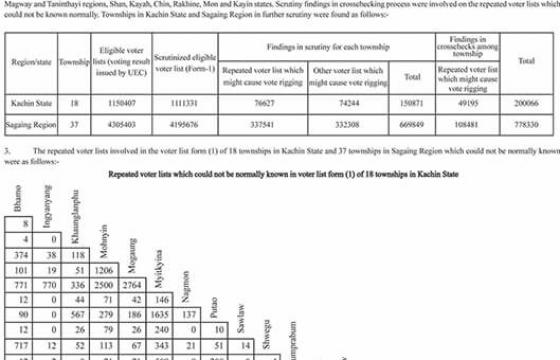The armed conflict in Kokang that started out on March 6 and at this writing is still continuing has captured major attention domestically and as well internationally. But parallel to this, a little less known war erupted between the Military or Tatmadaw and the Restoration Council of Shan State/Shan State Army (RCSS/SSA) recently, on March 7, needs to be discussed or taken into account. Because this is a serious challenge facing the mechanism of Joint Ceasefire Monitoring Committee – Union (JMC-U), which is one of the basic important arm of the Nationwide Ceasefire Agreement (NCA)-based peace process and also affects the other arm, Union Peace Dialogue Joint Committee (UPDJC), that is responsible to hold the 21st Century Panglong Conference (21CPC) or Union Peace Conference (UPC), under the Joint Implementation Coordinating Meeting (JICM) directive that is the highest organ in the implementation of the NCA.
JICM is made up of two party blocs: one is the government, parliament and Military and the other, the Ethnic Armed Organizations (EAOs), with each bloc having 8 representatives in the setup.
Under the JICM is the JMC-U composed of three party blocs: government, parliament and Military with 10 representatives; EAOs with 10 representatives; and civilian with 6 representatives.
The UPDJC, which is entrusted to hold the UPC or 21CPC, is made up of three party blocs: government, parliament and Military with 16 representatives; EAOs with 16 representatives; and political parties with 16 representatives respectively.
Now let us look at the military engagement between the Tatmadaw and the RCSS, followed by the problematic issues surrounding the Shan National Conference (SNC) that is supposed to take place under the rubric of NCA’s state-level or national-level political dialogue, to lend inputs to the UPC.
RCSS-Tatmadaw armed clashes
According to Shan Herald Agency for News (SHAN) report Burma’s armed forces have launched offensives against the RCSS/SSA, a signatory to the NCA, on March 7.
Lt-Col Sai Nguen, the RCSS/SSA spokesperson said that the Burmese troops from battalions 502
“Heavy fighting took place from 2pm until 6pm,” he said. “It was a premeditated attack; that is why it was so heavy.”and 242, which are under command of Military Operations Command (MOC 1) based in Kyaukme Township, opened fire on Tuesday on Shan positions in Oum Mu tract in northern Shan State’s Hsipaw Township.
He said that since his group signed the NCA in October 2015, it has clashed more than 20 times with the Burmese army, 5 of them which could be termed as serious heavy battles.
The Shan army spokesman speculated that the reason for the assault was part of a plan to push all ethnic armies out of Hsipaw and Kyaukme Townships.
Min Zaw Oo, director of JMC-U said that the clashes were due to the unfinished area demarcation and also the different interpretation of the Kengtung ceasefire agreement that was signed between the RCSS and the Tatmadaw in 2012.
According to Min Zaw Oo, the Kengtung agreement included demarcation areas, which from the the Tatmadaw took it as where the RCSS troops should be located. But understood by the RCSS as designated areas for its headquarters only. Based on this different interpretation, skirmishes happened as both parties accused each other of trespassing into its areas of control, reported 7 Day Daily on March 11.
Shan National Conference
According to the SHAN report of February 24, Burma’s military has intervened in plans for Shan National Conference (SNC), insisting that state capital Taunggyi cannot be used as a venue for the forum and instead directing organizers to smaller townships.
According to Col. Sai La, an official with the RCSS/SSA, which is hosting the event, his group met with Tatmadaw [Burmese military] representatives at talks mediated by the government-led Union Peace Dialogue Joint Committee (UPDJC) on February 15. He said that the Tatmadaw offered only a restricted shortlist of options for holding the SNC, which is the last forum where ethnic Shans may gather to express opinions and make decisions ahead of the national peace talks known as the 21st
Century Panglong Conference (21CPC), which is after postponing several times now slated to be held in May.
“The Tatmadaw said we could hold the conference in Mongpan, Mongtaw or Nam Pan Kun townships,” he told Shan Herald on February 24.
The three towns are each underdeveloped and inconvenient in terms of travel, accommodation and hospitality, he said.
“We requested permission to hold the SNC in Taunggyi,” said Sai La. “They responded by saying that only the Tatmadaw could stage official meetings in the state capital. Other than the three towns put to us, they would not budge in discussing the matter further.”
The ensuing request for permission to hold the SNC either in Taunggyi or Panglong, the historical town where the 1947 Panglong Agreement was signed, to Lt-Gen Khin Zaw Oo, a Tatmadaw representative at the UPDJC and Aung San Suu Kyi in her capacity as both State Counselor and chairperson of the UPDJC were also not successful, as both said that they could not interfere in what the military had ordered.
Regarding the row, Zaw Htay, the presidential spokesman said that “the UPDJC is at the moment discussing among themselves internally,” according to the 7 Day Daily report of March 7.
Reportedly, Colonel Sai Merng of RCSS said that the Committee for Shan State Unity (CSSU) has sent out representatives and met the people in some 40 townships, where data were being collected and is now ready for the national-level conference or dialogue.
But he said: “If national-level political discussion cannot be conducted, our participation in the Panglong convention also has to be reconsidered. Without inputs from the people, we could hardly participate comprehensively in the discussions.”
The Committee for Shan State Unity is comprised of Shan political parties and armed groups, including the Shan Nationalities League for Democracy (SNLD), the Shan Nationalities Democratic Party (SNDP), the Shan State Progress Party (SSPP) and the Restoration Council of Shan State (RCSS).
Outlook
Summing up the situation, the armed engagement between the RCSS and the Tatmadaw shows that even though the government is keen to portray that signing the NCA would create an absence of war and conducive to the peace process, the contrary proves to be the case.
According to the RCSS, starting from the time of NCA signing in October 15, 2015, there were more than 20 armed conflicts, with 5 of them serious and furious battles. Thus, it is evident that the JMC is not working and this self-help joint monitoring setup must be replaced or added up with a neutral international team to be credible, if ceasefire monitoring and enforcement are to be employed effectively. This is also the point of argument pushed forward by the United Nationalities Federal Council (UNFC) in its 9 point proposal to alter the present NCA.
Again, the convening of state-level or national-level political discussion or dialogue is hampered by the heavy-handedness of the Tatmadaw in even choosing the venue of holding the meeting in the case of SNC, needless to say of blocking the Arakan State conducting such a conference.
What the ethnic nationalities don’t understand is that why should the UPDJC dominated by the government and the military call the shot in even small matters like choosing the venue for national-level political discussion, which begs the question of how it would look like when it comes to the hardball political bargaining in the future.
In addition to these said problems, the government seems to have no idea on how to bring about the solution to the war in Kachin and Shan States; how to respond to the United Wa State Army (UWSA)-led Panghsang peace initiative; and how to concretely take up position on the UNFC’s 9 point proposal, rather than just a vague agreement in principle positioning, not to mention the internationally damaging country’s image caused by the area cleansing undertaking by the Tatmadaw against the Muslim population in the Arakan State.
While the issues to be resolved are many and seem impossible to overcome, they are interrelated. And as could be seen from the examples in Shan State, the government and the Military would need to do more on accommodation to facilitate the peace process, coupled with the acceptance of “all-inclusiveness” as time and again been urged to end the war in the north, if necessary by declaring unilateral ceasefire by the Tatmadaw.
It is not uncommon that the stronger party has to take the initiative to break the deadlock, in many of the conflict resolution settings. Thus, decisive change of policy that is embedded in altruism and largesse should be the way to go for the Tatmadaw.
It should also be noted that anything less than political accommodation and all-inclusiveness participation won’t be able to resolve the host of problems that have been burdening and bedeviling the country for so long.






